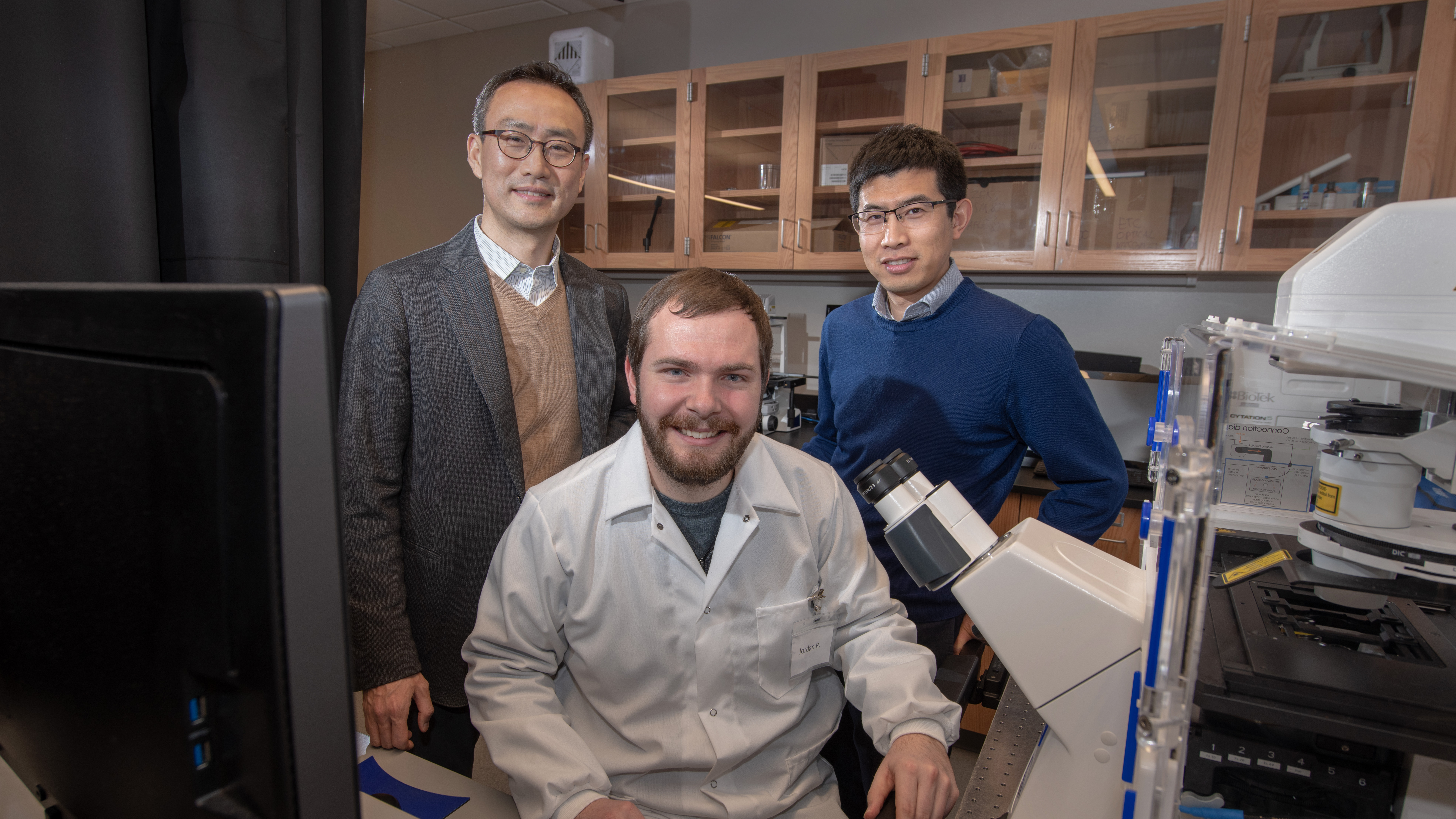
A team of Nebraska engineers is hoping its cell-stretching research will lead new understandings of how cells react to mechanical stimuli so that those expanded pathways might someday aid in fighting cancer and healing wounds.
The three-year, $439,584 grant from the National Science Foundation will allow a team led by Ruiguo Yang and Jung Yul Lim to also work on understanding how linked individual cells communicate with each other as they respond to physical changes in their shared environment.
Yang, assistant professor of mechanical and materials engineering, said the data they have shows the cells “can talk to each other,” and that there may be a mechanism that facilitates that communication.
The team is concerned with the cellular responses generated when those same mechanical inputs are applied to a linked pair of individual cells. These processes a cell goes through to create those responses is known as mechanotransduction, and understanding that could have implications to everyday medicine, Yang said.
https://engineering.unl.edu/engineers-hope-research-cell-cell-communication-could-stretch-medical-breakthroughs/
- - - - - - -
Inspired by biological systems such as human skin, eagle wings, octopus tentacles and elephant trunks, Nebraska engineer Fadi Alsaleem has a patent pending for a micro-electromechanical systems (MEMS) technology capable of integrating sensing, actuation and computation internally within a soft material.
The development and advancement of these smart materials will allow the materials to perform complex computing and respond without the need of a conventional computer system.
That will have an impact on a large variety of applications, said Alsaleem, assistant professor of architectural engineering. Those could include airfoils that change their aerodynamic profile to skins with a realistic sense of touch that will allow for robots to do work that has typically been hazardous.
https://engineering.unl.edu/fadi-alsaleem-awaiting-patent-mems-technology-soft-materials-do-sensing-and-computing/
- - - - - - -
A team including Greg Bashford, professor of biological systems engineering, Steven Barlow, professor of special education and communication disorders, and graduate students recently published findings in the Journal of Neuroimaging that demonstrated the technologies they have developed to evoke somatosensory stimulation significantly raised cerebral blood flow to areas typically affected by large vessel ischemic stroke.
These findings, along with previous research by Barlow’s and Bashford’s teams, has led to a partnership with CHI Immanuel Medical Center in Omaha to utilize the technology with patients affected by cerebrovascular stroke.
Barlow said he, Bashford and a team of graduate students will soon bring somatosensory stimulation and improved blood flow monitoring to stroke sufferers in clinical trials.
https://news.unl.edu/newsrooms/today/article/nebraska-researchers-readying-revolutionary-stroke-treatment/
- - - - - - -
The Office of Undergraduate Research is excited to launch a new opportunity for the 2019-20 academic year. First Year Research Experience allows students to use their federal work study funds in a research or creative activities job, enabling students to get paid to learn. FYRE will match interested freshman with faculty mentors to learn about research and creative activity in the mentor’s field by spending five hours a week on a manageable project over the course of the year.
OUR is seeking faculty mentors who are committed to student success through high-impact learning practices like undergraduate research and are interested in developing projects and opportunities for freshmen. Job descriptions from interested faculty mentors for the 2019-20 academic year are due May 1.
Learn more about the program and how to submit your job description on the UCARE website or attend the March 11 faculty information session at 4 p.m. in the Love Library South 127 Conference Room. Space is limited, so please register in advance.
Contact Justina Clark at jclark17@unl.edu or 402-472-6023 for more information.